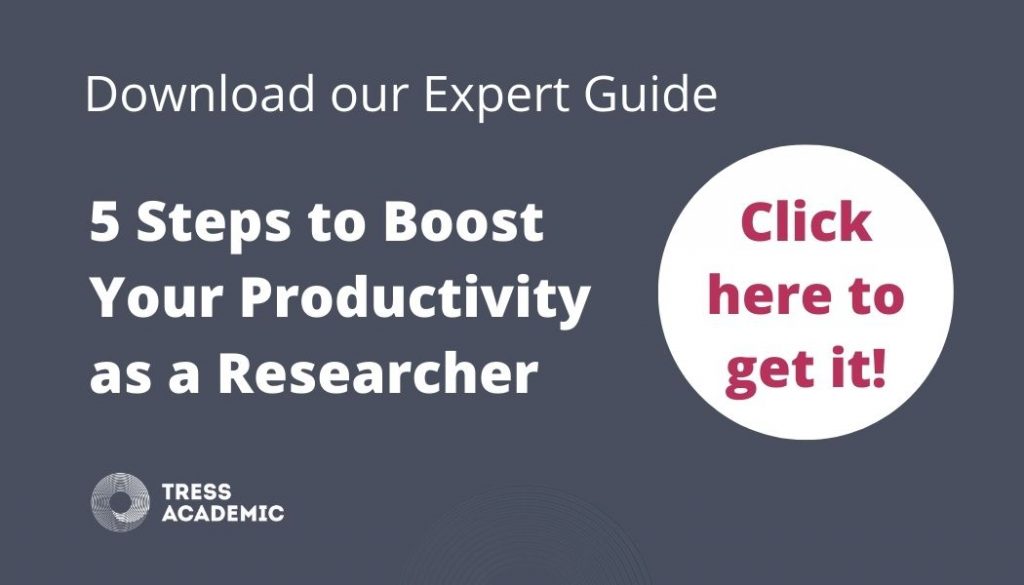Do you look for excellence in every piece of work you do? Do you want to write the perfect email, the perfect paper, the perfect job application? In this blog post, we tell you why it is sometimes better to go with a less perfect result and to make sure that you can progress with your work. Spot the pitfalls of perfectionism, and learn how you can end up with a result that everybody is happy without going into perfectionistic overdrive.
Recently I did the shopping in one of the local supermarkets. I wanted to buy a fresh cucumber to make Tzatziki. I bent down to have a closer look at the cucumbers in one of the bottom shelves. Not being able to see which one was the best, I started squeezing them lightly to figure out how crunchy they still were. Much to my dismay, they all proved to be rather soft, so I started going through the entire basket. Meanwhile another shopper bent down, picked a cucumber and continued shopping. I was still squeezing one after the other when another shopper came, and picked one and left . . it was then that I had this light-bulb moment:
My perfectionism kept me from completing my task (e.g. the entire round of shopping) efficiently, and if I kept doing this with the apples and lettuce and everything else, I would be delayed indefinitely. The other two customers were probably already at home enjoying themselves when I had just made it to the till. I know it was so wrong . . . the cucumbers were mediocre this time, but they all were, so searching forever for the perfect one did not make any difference!
What is perfectionism?
We often describe colleagues who seem to strive for excellence in everything they do as perfectionists. But while the ambition to do excellent work has a positive connotation, being a perfectionist has a negative edge to it. Participants in my PhD courses mention that they perceive themselves as perfectionists and ask what to do about it. They clearly feel that there’s something detrimental to it, and are looking for a remedy. They are in pursuit of doing great work, but feel that their perfectionism is also hampering them.
Stoeber & Damian (2016) describe perfectionism as “a personality disposition characterised by striving for flawlessness and setting exceedingly high standards for performance accompanied by tendencies for overly critical evaluations”, also referring to work by Frost et al. (1990) and Hewitt & Flett (1991).
Others perceive perfectionism as purely negative, saying that positive perfectionism is an oxymoron (Greenspon 2000), and describe it as ‘not a healthy pursuit of excellence’ (University of Texas 2008).
We stick to the above definition by Stoeber & Damian (2016), which is also closer to the day-to-day use of perfectionism in academic settings. In short, to us perfectionism is the striving for excellence somehow overdone!
Perfectionism in academic settings – what it is
Work in scientific environments is characterised by accuracy and precision, expectations of high quality, delivering significant results, and making important contributions to your field of research. There is little space for ambiguity, sloppiness, doubts, errors, or flaws.
Many of us were motivated to work in science because we like to deliver work of superior quality, we enjoy the constant striving for new insights, and find value in the quest for granularity. The high competition and selection in science spurs us on to high achievements and outstanding results, which in principle is a great thing. But when this pursuit of excellence is overdone, it can have a crippling negative effect.
While the striving for excellence is helping scientists to achieve the very ambitious results they are striving for, it is a chore at the same time. Perfectionism appears when the striving for excellence is:
- overdone
- transferred to each and every context, including those where no excellence is required.
The perfectionist scientist
To just give you a few examples, the perfectionist researcher is the one who:
- triple-checks every email because the wording might still be improved
- spends endless hours fine-tuning the end-of-year report although it’s only needed for administrative purposes and few colleagues will ever look at it
- elevates the input for a discussion or meeting with a project partner to the same standards as a scientific paper
- downloads 50 potential photographs that could be used as an illustration on a conference-poster before being able to choose the perfect one
- accumulates a massive amount of data and undertakes every possible analyses before trying to select a handful that might end up in a publication (if they ever come that far)
- are afraid of showing work in progress to a supervisor because they feel it’s not good enough
- calls HR multiple times to make sure that they correctly complete the form for travel-reimbursement

Quality counts . . . sometimes
There is a very fine line between the positive effect of doing excellent work, and overdoing it so that it turns out to have a negative effect. This line can be hard to see, and thus difficult to recognise when being crossed. We also think that there are occasions in your career and professional situations when it makes sense to ‘give it your all’ and strive for the best possible result. To mention a few examples, think of applying for a research grant, submitting a paper to a high profile journal, writing a job application,speaking in a job interview, or applying for tenure. These are some crucial situations where quality really counts and your actual performance makes a difference.
But to overdo the pursuit of excellence means to transfer and apply the same high quality standards to every situation — those where it does not really matter, and eventually your private life as well. You end up wasting time browsing all cucumbers in the basket. This is where the negative and harmful effect happens. If you are procrastinating tasks for your PhD project and need help to overcome this, see our free expert guide “Five reasons why PhD students delay and how to avoid.”
Scientists are conditioned to become perfectionists
Conditioning is a behavioural process whereby a response becomes more frequent or more predictable in a given environment as a result of reinforcement, with reinforcement typically being a stimulus or reward for a desired response (Encyclopedia Britannica). Throughout your primary and university education, you are conditioned to learn that perfect work and preparation leads to success. Becoming aware of this success strategy, you try to be even more perfect in what you do in the future.
The problem is that in a scientific institute, you are together with many others who were conditioned in the same way and apply the same strategy. Scientific environments are a kind of hotbed for perfectionists. Standards and mutual expectations goad each other and become sky-high, and are sometimes unachievable or only achievable with high personal sacrifice.
By the time you do a PhD or work as a postdoc, you have already been conditioned to be perfect. You learned throughout your academic life that perfect work leads to excellent results and gives you a chance to move on to the next level. Some researchers have internalised this behaviour to the degree that it is applied to each and every situation. All work that has to be done is done to the same high standard, whether it is an e-mail to a funding agency, an outreach activity, or a phone call to a colleague that is prepared meticulously.
Pitfalls of perfectionism
The list of negative consequences of perfectionism is long. Ironically, perfectionism undermines the very success it is seeking. In trying to complete every project to super-high-standards, perfectionists go into more detail than would be required, and thus have to put in more energy and hours than others, move slower, and ultimately complete less. There’s a high investment against a relatively low output.
Perfectionism can significantly hamper your progress with your PhD if you search for the perfect study area, try to write the perfect literature review, set up a huge study to test for all possible variables, and analyse and re-analyse over and over until the perfect correlations pop up.
Perfectionists are not as successful as they could be. They have overly high expectations that are difficult to achieve, or are entirely unattainable. Due to that, they are never happy with the outcome and are under constant stress. Increased dissatisfaction, frustration, performance anxiety, and anger are some of the consequences.
But not only do perfectionists have overly high expectations towards themselves, they also tend to expect others to be as perfect as they are. No surprise then that trouble at the workplace or at home is a common issue among perfectionists, with strained interpersonal relationships in both arenas (University of Texas, 2008).

First steps out
Telling a perfectionist to work to lower standards is about as helpful as telling an addict to drop the drug. But there are a few steps every perfectionist can take to get a handle on the problem.
Becoming aware of contexts and situations in which you are unnecessarily perfectionistic is part of the strategy. The next time you spend endless hours on a task, see if it’s actually worth it.
Ask yourself the following:
- Is the task I am working on actually worth the time and effort I am about to invest? How important is the task itself and its outcomes for achieving my current goals. For further information on goalsettings, see our blog post #47: “Plan your project – save your PhD”.
- Does it pay off? Will there be a benefit or advantage to delivering an excellent result?
- Does it not pay off? Will there be a benefit or advantage to doing it ‘just ok’ and moving on to more important stuff?
Weaning yourself off will take some time and effort. As most perfectionists know: Doing a job less good requires more self-discipline than doing a better job.
Conclusion
Reading this article may help you become aware of your perfectionist streak. Learn to discern when in your career and life it makes sense to work to very high standards, and when it’s simply not worth it.
After my flash-bulb experience in the supermarket, I stopped analysing, picked the next best cucumber, and moved on. I still struggle to work to lower standards, but I make a deliberate effort to live with imperfect but entirely acceptable results. The one thing I noticed was that more often than not, I am the only one who can see a difference. Everyone else is ‘perfectly’ happy with my not-so-perfect result.
Resources
- Expert guide: Five reasons why PhD students delay and how to avoid.
- Blog post 105: The perfect paper—and how to create yours!
- Blog post 47: Plan your project – save your PhD.
- Antony, M.M. Swinson, R.P. 2009: When Perfect isn’t good enough. New Harbinger, 2nd ed.
- Frost, R. O., Marten, P., Lahart, C., & Rosenblate, R. 1990: The dimensions of perfectionism.
- Cognitive Therapy and Research, 14, 449-468.
- Hewitt, P. L., & Flett, G. L. 1991. Perfectionism in the self and social contexts: Conceptualization, assessment, and association with psychopathology. Journal of Personality and Social Psychology, 60, 456-470.
- Levine, I.S. 2008: Mind Matters: Too Perfect? Science Magazine: Careers. 28 March, 2008, DOI: 10.1126/science.caredit.a0800044
- Stoeber, J. and Damian, L.E. 2016: Perfectionism in employees: Work engagement, workaholism, and burnout. In: Sirois, Fuschia M. and Molnar, Danielle S., eds. Perfectionism, health, and well-being. Springer, New York, pp. 265-283. https://kar.kent.ac.uk/43727/
- University of Texas 2008: Perfectionism. A Double-Edged-Sword. The Counseling & MEntal Health Center, University of Texas. https://www.lib.sfu.ca/system/files/28965/Perfectionism-U-of-Texas.pdf
More information
Do you want to successfully complete your PhD? If so, please sign up to receive our free guides.
© 2020 Tress Academic
